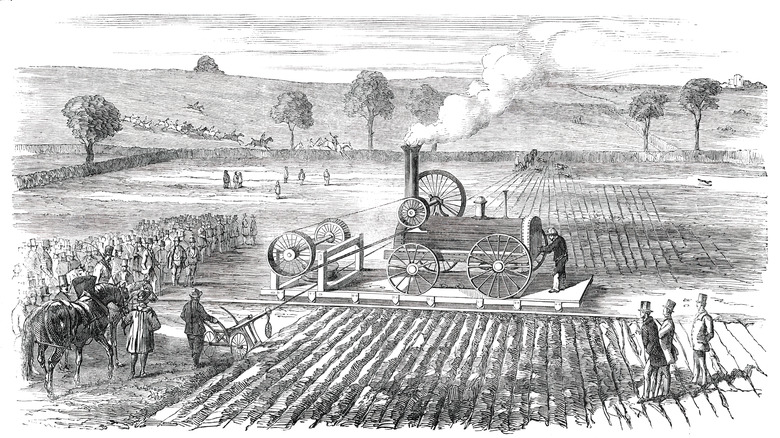Ever Wonder Why We Eat Three Meals A Day?
Most people know breakfast, lunch, and dinner as second nature, and they are an ingrained part of American culture. However, the concept of eating three meals a day is relatively new and stems from the Industrial Revolution. Before then, daily meals looked very different from what we're used to now.
For instance, in ancient Rome, it was customary to only eat a single large meal every day, usually around noon. Vikings and ancient Chinese ate two, one during the day and another at night. Likewise, hunter-gatherer cultures, like the Native Americans, would eat when they were hungry or when food was available. Things began changing around the 17th century when breakfast became common among most social classes in Europe, spreading across the globe through colonization. At that time, most people in England ate twice a day: breakfast in the morning and a main meal later in the day.
Lunch was the last meal to be added. It gained popularity around the 1850s and became a mid-day ritual around the turn of the century. One reason for this was the lengthening of workdays due to the influx of artificial light. As people worked longer, adding an extra meal to the daily grind became necessary, while dinner was pushed back to later in the evening when shifts ended. At the same time, the British Empire was continuing its spread and would peak in 1919. As the Brits expanded, their industrial influence did as well, leading to the adoption of Western eating habits by other cultures.
How the Industrial Revolution changed the way we eat
If one point in history is the most to blame for our current dietary habits, it's the Industrial Revolution of the late 18th century. Before this, folks were beholden to an agrarian society where crops, manually sown and reaped, were the primary source of food production. This limited the amount that could be produced and forced people to be much more self-sufficient, especially those in the lower classes. However, as technology developed during this time, urbanization began as manufacturing drew people from rural places into city centers for work. Along with this, new farming technology allowed for a greater amount of mass-produced goods, changing the way people lived and ate.
Some of the biggest industrial changes occurred in mass production and improved food distribution through railways and refrigerated train cars, which made transporting perishable food longer distances possible. Before, food was localized, and you couldn't just pop over to the corner shop and expect to find all the fresh produce you wanted. Moreover, it was the mass migration of folks to urban areas that directly contributed to the increased demand for production and distribution changes. All of this goes hand-in-hand with the increase in jobs in manufacturing sectors that gave folks more disposable income to spend on food.
Alongside this, industrialization caused people to rethink how they ate, especially as working hours became longer. During this time, breakfast was something you ate before heading off to work, and lunch was a small meal or snack, like peanuts and coke, meant to tide folks over until they could get home for dinner. As things progressed, people began moving toward processed foods, especially after World War II, when more women were entering the workforce and weren't beholden to cooking all day.
Do we actually need to eat three meals a day?
While eating three meals a day has become the norm in modern culture, is it actually necessary? Well, it depends. According to a 2015 study published in the Journal of the Academy of Nutrition and Dietetics, the number of people eating three times daily has significantly declined since the 1970s. This may be because the three-meal-per-day custom is largely designed around an industrial-era work schedule that isn't necessarily the norm today.
Although Sarah Francis of Iowa State University states that three meals can help with food diversity and reduce nutritional deficiencies, Drs. Eve Glazier and Elizabeth Ko at UCLA say that it's not how many meals you eat but rather the nutritional quality and number of calories you consume when you do. Moreover, how often you need to eat will also depend on your activity levels, health, and schedule. For instance, people in labor-intensive jobs that burn many calories will need to take in more from meals to make up for what they're losing.
So, while eating three times a day can benefit some people, there's no universal reason why everyone should do it. As Healthline points out, a better rule is to eat when you're hungry, stop when you're full, and repeat that cycle daily.


